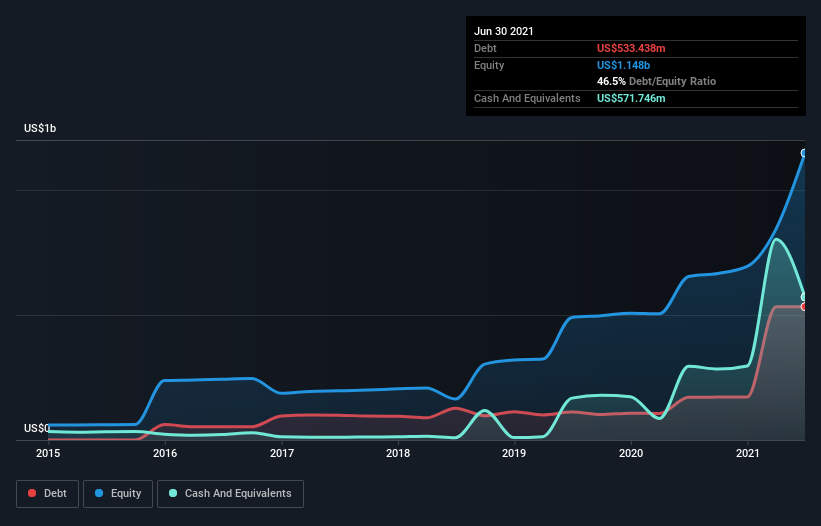Some say volatility, rather than debt, is the best way to think about risk as an investor, but Warren Buffett famously said that 'Volatility is far from synonymous with risk.' It's only natural to consider a company's balance sheet when you examine how risky it is, since debt is often involved when a business collapses. We can see that NeoGenomics, Inc. (NASDAQ:NEO) does use debt in its business. But is this debt a concern to shareholders?
What Risk Does Debt Bring?
Debt assists a business until the business has trouble paying it off, either with new capital or with free cash flow. If things get really bad, the lenders can take control of the business. However, a more common (but still painful) scenario is that it has to raise new equity capital at a low price, thus permanently diluting shareholders. Of course, plenty of companies use debt to fund growth, without any negative consequences. The first step when considering a company's debt levels is to consider its cash and debt together.
How Much Debt Does NeoGenomics Carry?
You can click the graphic below for the historical numbers, but it shows that as of June 2021 NeoGenomics had US$533.4m of debt, an increase on US$170.9m, over one year. However, its balance sheet shows it holds US$571.7m in cash, so it actually has US$38.3m net cash.

How Healthy Is NeoGenomics' Balance Sheet?
According to the last reported balance sheet, NeoGenomics had liabilities of US$99.1m due within 12 months, and liabilities of US$648.8m due beyond 12 months. Offsetting these obligations, it had cash of US$571.7m as well as receivables valued at US$108.8m due within 12 months. So it has liabilities totalling US$67.4m more than its cash and near-term receivables, combined.
This state of affairs indicates that NeoGenomics' balance sheet looks quite solid, as its total liabilities are just about equal to its liquid assets. So it's very unlikely that the US$5.52b company is short on cash, but still worth keeping an eye on the balance sheet. Despite its noteworthy liabilities, NeoGenomics boasts net cash, so it's fair to say it does not have a heavy debt load! There's no doubt that we learn most about debt from the balance sheet. But ultimately the future profitability of the business will decide if NeoGenomics can strengthen its balance sheet over time. So if you want to see what the professionals think, you might find this free report on analyst profit forecasts to be interesting.
Over 12 months, NeoGenomics reported revenue of US$489m, which is a gain of 21%, although it did not report any earnings before interest and tax. Shareholders probably have their fingers crossed that it can grow its way to profits.
So How Risky Is NeoGenomics?
While NeoGenomics lost money on an earnings before interest and tax (EBIT) level, it actually booked a paper profit of US$72m. So when you consider it has net cash, along with the statutory profit, the stock probably isn't as risky as it might seem, at least in the short term. The good news for NeoGenomics shareholders is that its revenue growth is strong, making it easier to raise capital if need be. But we still think it's somewhat risky. The balance sheet is clearly the area to focus on when you are analysing debt. But ultimately, every company can contain risks that exist outside of the balance sheet. These risks can be hard to spot. Every company has them, and we've spotted 4 warning signs for NeoGenomics (of which 2 are potentially serious!) you should know about.
Of course, if you're the type of investor who prefers buying stocks without the burden of debt, then don't hesitate to discover our exclusive list of net cash growth stocks, today.
This article by Simply Wall St is general in nature. We provide commentary based on historical data and analyst forecasts only using an unbiased methodology and our articles are not intended to be financial advice. It does not constitute a recommendation to buy or sell any stock, and does not take account of your objectives, or your financial situation. We aim to bring you long-term focused analysis driven by fundamental data. Note that our analysis may not factor in the latest price-sensitive company announcements or qualitative material. Simply Wall St has no position in any stocks mentioned.
Have feedback on this article? Concerned about the content? Get in touch with us directly. Alternatively, email editorial-team (at) simplywallst.com.
The views and opinions expressed herein are the views and opinions of the author and do not necessarily reflect those of Nasdaq, Inc.


